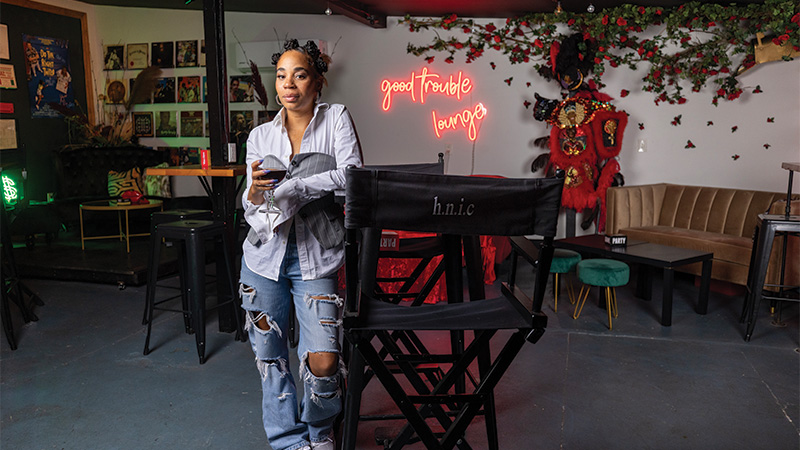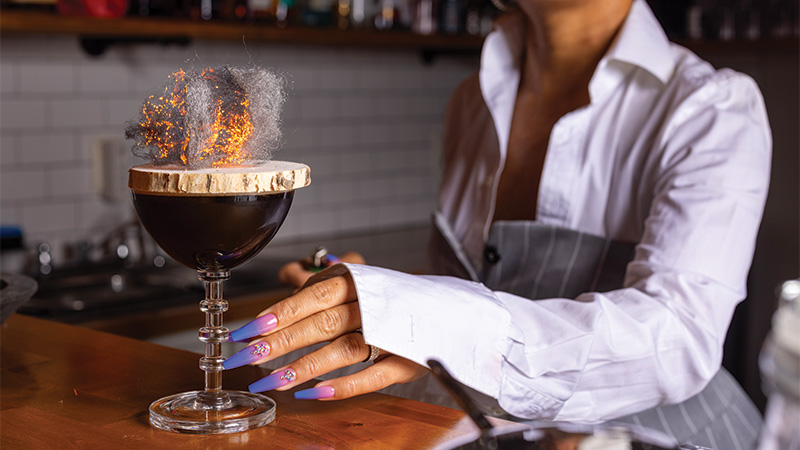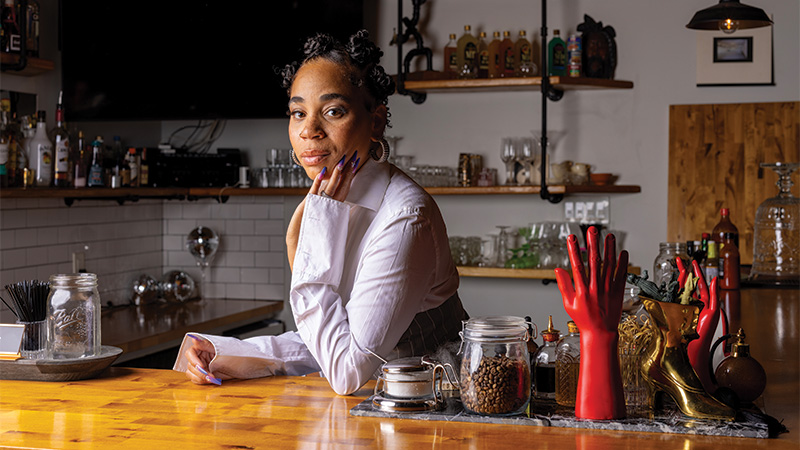This feature is part of our 2023 Next Wave Awards.
Check out Deniseea Head’s Instagram page and you’ll instantly be immersed in the technicolor world of “Chicken & Champagne.” The feed is a disco ball of self-expression, glittering with mixed drinks, music, and mini history lessons that drop Black cocktail knowledge on even the most passive scroller. It’s also a glimpse into the dream career Head has cultivated: spreading knowledge about the Black community’s pivotal role in cocktail culture.
“Many people have said, ‘Well, you know, does all the history have to be Black?’” she says. “Absolutely, yes. It’s American history.”
Don’t Miss A Drop
Get the latest in beer, wine, and cocktail culture sent straight to your inbox.

The Inglewood, Calif., native’s career behind the stick began in New York City in her 20s, and after some time in Atlanta, she eventually settled in New Orleans. There, Head shares Black history and education through private and group mixology classes, bar experiences and events, and homemade liqueurs and cocktail mixers — all under the brand Chicken & Champagne.
The pandemic forced much of Head’s services online by way of virtual cocktail classes and social media tutorials, and this online presence ended up growing her business even further. Chicken & Champagne’s large portfolio of clients now includes Coca-Cola, Jack Daniel’s, Oatly, and LeBron James-backed production company SpringHill, to name a few. All these projects place the Black community’s contributions to the drinks, hospitality, and entertainment industries at the forefront. Just this summer, Head hosted a class covering Black Music Month and the history of the Chitlin’ Circuit for beneficiaries of The Executive Leadership Council, an organization dedicated to supporting up-and-coming Black executives.
“This just goes to show that your career can be whatever you make it,” Head says. “I’m in love with history, and the bar is one of the only places where you can get strangers together to get to know each other that would have never hung out.”

In that spirit, the 34-year-old and husband Darnell Head co-opened their New Orleans speakeasy Good Trouble, named in honor of the late U.S. congressman and civil rights activist John Lewis. And because, she says, “I cause good trouble sharing stories people and brands may not want to hear.”
The space — the location of which we obviously won’t disclose — has been visited by its share of “heavy hitters” including professional athletes, actors, and the like. At the start of the night, Head often begins by telling a story that complements the cocktails at hand, and will continue her “lesson” over the course of the evening while guests imbibe. Want an invite? You’ll have to know someone who’s been before — or you can DM her. If you’re lucky, a message with the venue’s address will appear in your inbox. Once inside, you’ll pay for her knowledge and the candy offered inside, and nothing else.
The cloak-and-dagger isn’t employed only to permit a certain crowd. In fact, it’s meant to straddle the high-low duality of New Orleans’ drinking scene: Good Trouble’s pulse registers somewhere between the feverish thrum of the hard-partying French Quarter and the slow but steady beat of the city’s old-school cocktail institutions.
“This speakeasy falls between looking to the past and looking at the future: It’s got nostalgia and enough debauchery like Bourbon Street — but here, you’re safe,” Head says. “You can actually have a meaningful cocktail in a meaningful space.”
The focus of Head’s storytelling is, quite literally, all over the walls. Among the decor: Jim Crow-era memorabilia, film posters from iconic director Spike Lee’s “Do The Right Thing,” and portraits of dance legend Judith Jameson.

“It’s a Black culture museum,” she says of the space. “You can’t get away from Black history when you’re talking about spirits and entertainment. Juke joints came about because we weren’t allowed in the regular places — only if we were performing. And even then, we still had to enter through the back and go out the back. But in the speakeasies, we were the guests and the entertainment.”
The ambiance draws clear connections between the spirits in guests’ hands and where their cocktails came from. But equally as vital, they’re conversation pieces mounted to ensure the good practice that’s important to any bartender worth their salt: responsible drinking. “In order to have that,” Head says, “you gotta be entertained in other ways. The room is full of talking points.”
Despite its firm sense of place, Head says that wherever she travels or lands in the future, the speakeasy and its essence will go with her. On the horizon: roving pop-ups and publishing a cocktail book. As for the future, Head says she’ll never stop pushing when it comes to the business she’s built.
“I meet people where they are. I can tell you some stories and not make it feel like you’re in class, or at least it can be a class you can enjoy,” she says. “But I just couldn’t get away from this passion.”


